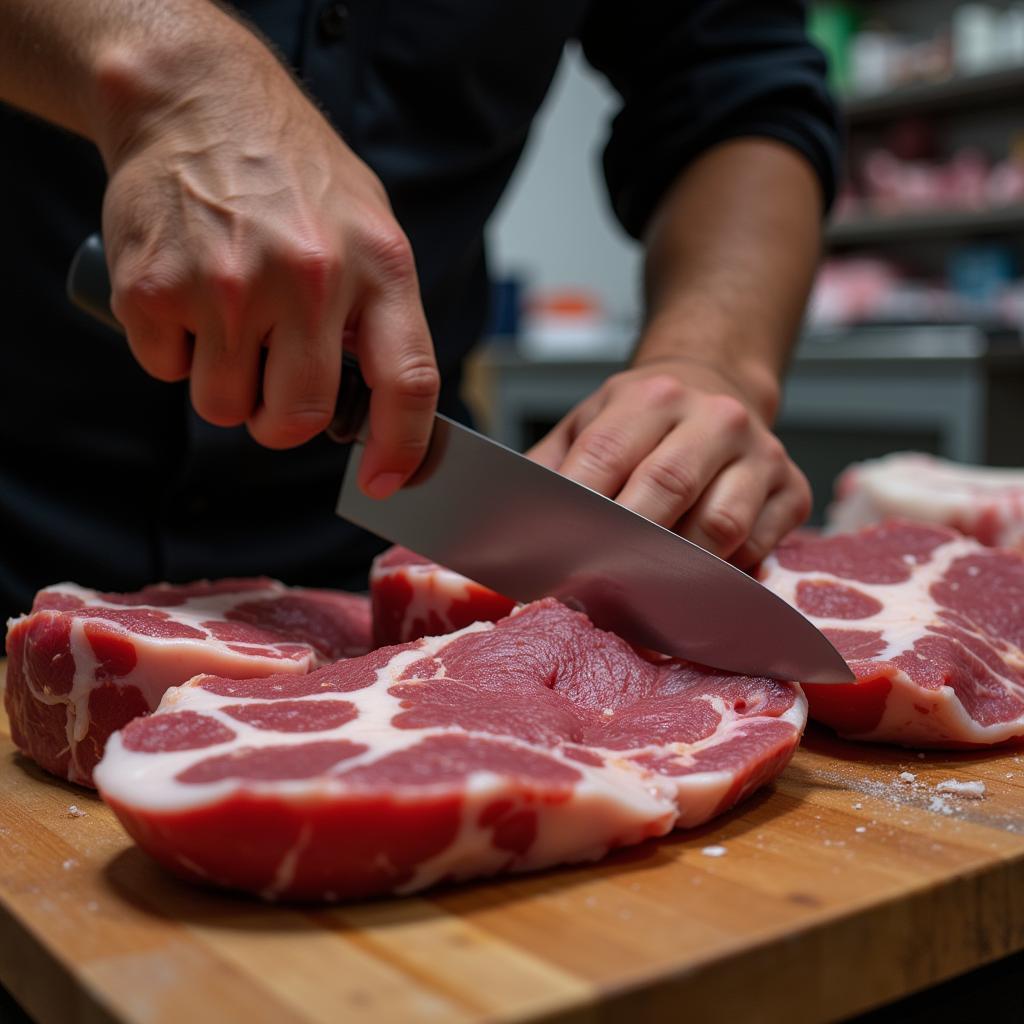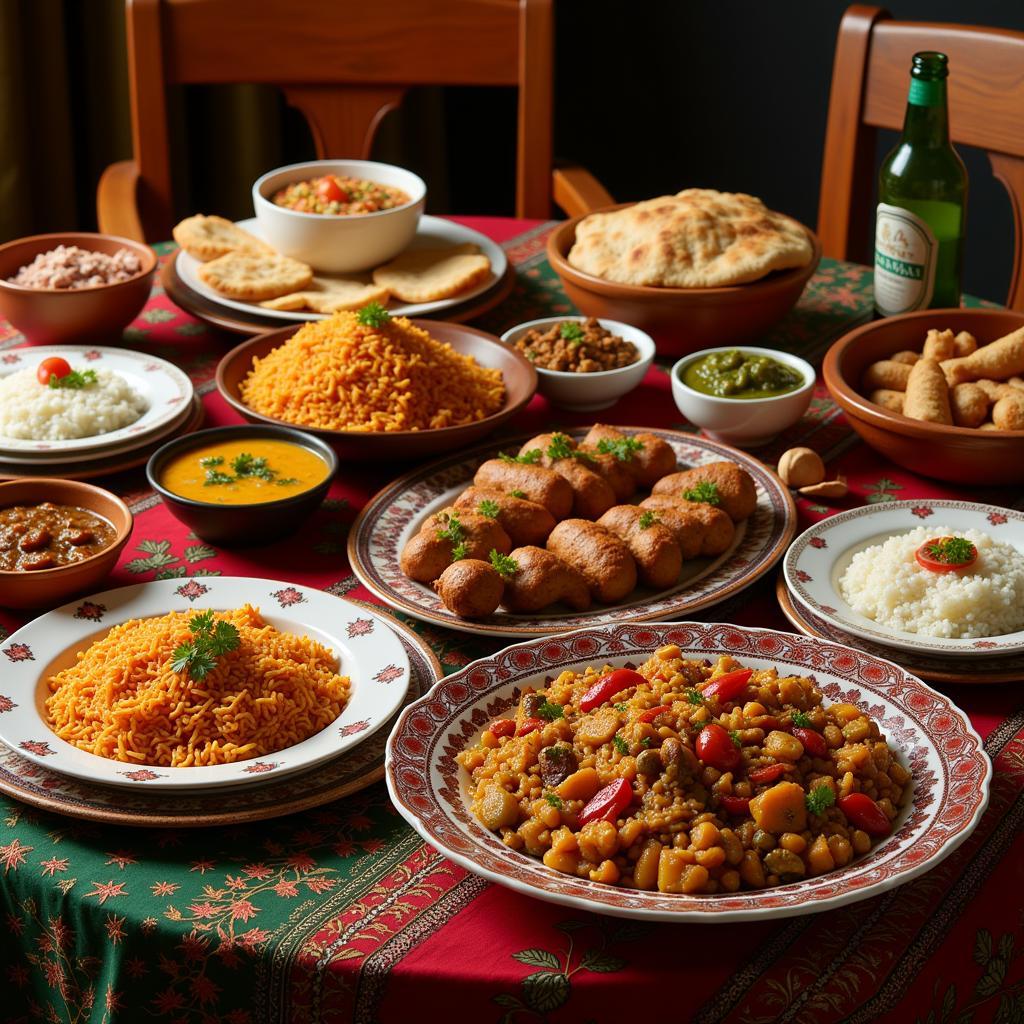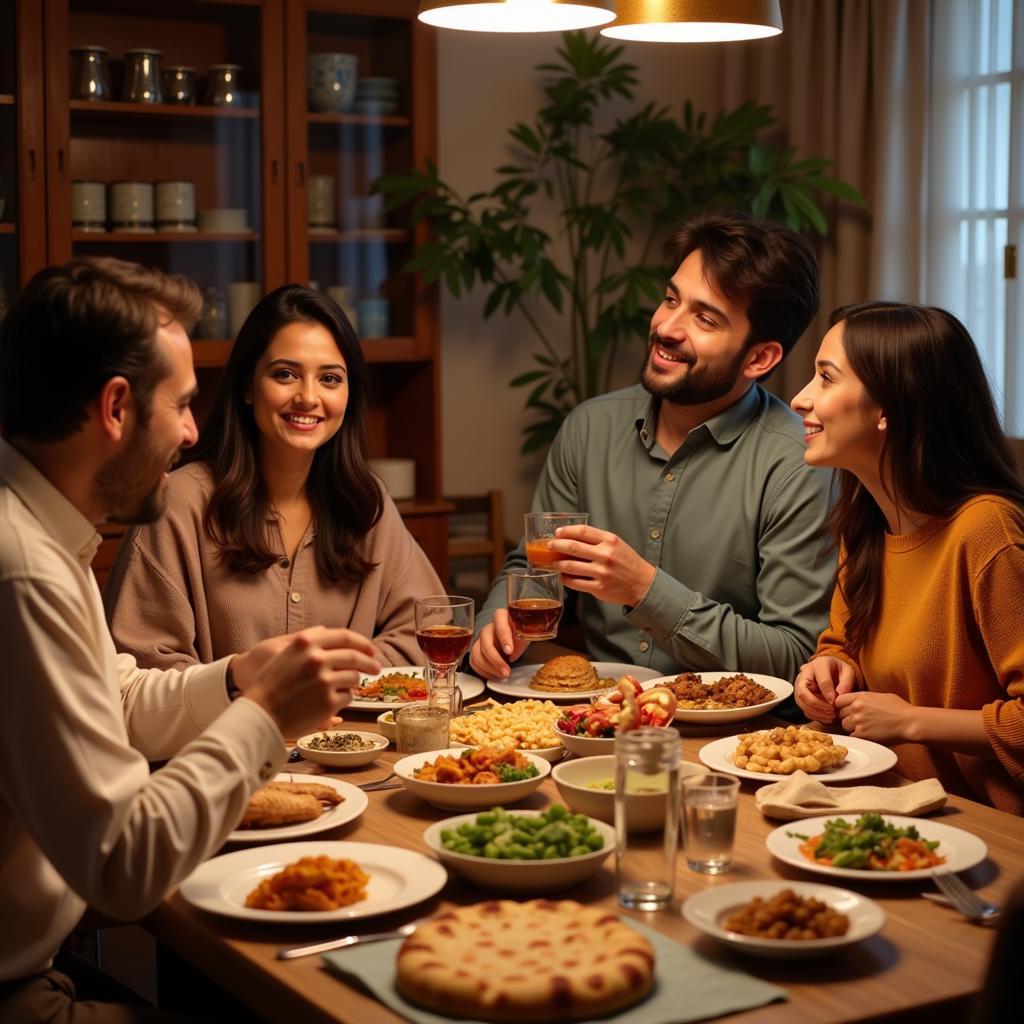Pakistan Halal Food offers a rich tapestry of flavors and traditions, reflecting the diverse culinary landscape of the country. From aromatic biryanis to succulent kebabs, exploring Pakistani cuisine is a journey through centuries of culinary heritage, influenced by Central Asian, Middle Eastern, and Indian flavors. This article will delve into the world of Pakistan halal food, uncovering its unique characteristics, diverse dishes, and the cultural significance behind it.
What Makes Pakistan Halal Food Unique?
Pakistan halal food adheres to Islamic dietary laws, emphasizing the ethical treatment and preparation of meat. Beyond this, what sets it apart is the artful blend of spices, the slow cooking techniques, and the emphasis on fresh, seasonal ingredients. Generous portions, vibrant colors, and the tantalizing aroma of spices are all hallmarks of this cuisine. Whether it’s the smoky flavor of a tandoori chicken or the rich gravy of a nihari, Pakistan halal food is an experience for all the senses. What truly defines Pakistan halal food is the use of distinct spice blends, which vary from region to region, resulting in a fascinating array of flavors.
Understanding Halal Practices in Pakistan
Halal is more than just a dietary restriction; it’s a way of life. It represents purity, respect, and ethical treatment of animals. In Pakistan, halal practices are deeply ingrained in the culture, influencing not only food but also various aspects of daily life. Butchers are trained in specific methods of slaughter, and restaurants proudly display their halal certifications, assuring customers of the authenticity and integrity of their food.
 Pakistani Halal Butcher Preparing Meat
Pakistani Halal Butcher Preparing Meat
Exploring the Diversity of Pakistan Halal Dishes
Pakistan halal food boasts a vast repertoire of dishes, each with its own distinct character. From hearty meat curries to flavorful vegetarian options, there’s something to tantalize every palate. Biryanis, pulaos, and kebabs are perhaps the most iconic dishes, but the culinary landscape extends far beyond these staples. Let’s take a closer look at some must-try dishes:
- Biryani: A mixed rice dish with meat, vegetables, and fragrant spices, often cooked in a sealed pot for a rich, layered flavor.
- Nihari: A slow-cooked stew made with tender meat, bone marrow, and a medley of aromatic spices.
- Seekh Kebab: Minced meat skewers marinated in a blend of spices and grilled to perfection.
- Haleem: A hearty stew made with lentils, wheat, barley, and meat, slow-cooked to a creamy consistency.
- Samosas: Crispy, deep-fried pastries filled with spiced potatoes, peas, and other savory ingredients.
Regional Variations in Pakistani Cuisine
Just as the landscape of Pakistan varies, so does its cuisine. From the mountainous north to the coastal south, each region has its own unique culinary traditions. For instance, the northern areas are known for their hearty meat dishes and the use of dried fruits and nuts, while the southern regions feature a greater emphasis on seafood and lighter spices.
 Diverse Pakistani Halal Dishes on a Table
Diverse Pakistani Halal Dishes on a Table
The Cultural Significance of Pakistan Halal Food
Food is an integral part of Pakistani culture, playing a central role in celebrations, gatherings, and everyday life. Sharing a meal is considered an act of hospitality and a way to strengthen bonds. From weddings to religious festivals, food is at the heart of every occasion. The preparation and sharing of food are deeply rooted in tradition, passed down through generations.
Pakistan Halal Food Beyond Borders
The popularity of Pakistan halal food has transcended geographical boundaries, with Pakistani restaurants flourishing in cities across the globe. This global presence is a testament to the universal appeal of its flavors and the cultural exchange it fosters. You can find amazing halal options at the desi food market orléans.
Conclusion
Pakistan halal food is more than just a meal; it’s a culinary adventure, a cultural experience, and a celebration of tradition. From the bustling street food stalls to the elegant dining rooms, the world of Pakistan halal food offers a wealth of flavors and experiences waiting to be discovered. So, embark on a culinary journey and explore the rich tapestry of Pakistan halal food, savoring the unique tastes and aromas that define this vibrant cuisine.
FAQ
-
What is the difference between biryani and pulao? Biryani is typically cooked in layers, while pulao involves cooking the rice and meat together.
-
What are some popular Pakistani desserts? Gulab jamun, rasmalai, and kheer are just a few of the many delicious Pakistani desserts.
-
Where can I find authentic Pakistan halal food? Look for restaurants that specialize in Pakistani cuisine and proudly display their halal certifications. You can even explore options at your local desi food market orléans.
-
What are some common spices used in Pakistan halal food? Cumin, coriander, turmeric, ginger, garlic, and chili powder are some of the staples.
-
Is Pakistan halal food spicy? The level of spice can vary depending on the dish and regional preferences.
-
What are some vegetarian Pakistan halal food options? Dal makhani, chana masala, and vegetable biryani are popular choices.
-
What is the significance of halal in Pakistan? Halal represents adherence to Islamic dietary laws, emphasizing ethical treatment and preparation of food.
 Family Enjoying Pakistani Halal Meal
Family Enjoying Pakistani Halal Meal
Common Scenarios and Questions:
-
Scenario: You are planning a dinner party and want to impress your guests with a unique cuisine.
-
Question: What are some impressive Pakistan halal dishes that are relatively easy to prepare?
-
Scenario: You are traveling to Pakistan and want to experience the local cuisine.
-
Question: What are some must-try Pakistan halal food dishes and where can I find them?
-
Scenario: You are trying to eat healthier and are looking for halal options.
-
Question: Are there any healthy Pakistan halal food options available?
Further Exploration:
For more information on halal food and international cuisine, you might find our article on the desi food market orléans helpful.
Contact Us:
For assistance, please contact us at Phone Number: 02437655121, Email: minacones@gmail.com Or visit us at: 3PGH+8R9, ĐT70A, thôn Trung, Bắc Từ Liêm, Hà Nội, Việt Nam. We have a 24/7 customer service team.